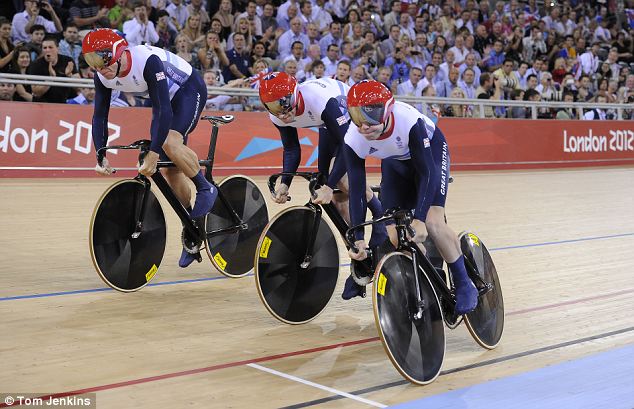
You all know the story by now, Phil Hindes didn’t like his start in the team sprint so he deliberately fell off to get a restart. The rule exists so that if you fall off or pull your foot out you get a second shot, it’s like the second serve in tennis.
The trouble is there is another rule that effectively says you are not to abuse this privilege, on pain of disqualification, from the round or the entire competition depending on severity. Since it’s usually impossible for the commissaire to judge with 100% certainty if it was an accident or not (however obvious it is) the rule has (to my knowledge) never been enforced.
The trouble was that Hindes admitted to faking his fall to the BBC’s Jill Douglas (and the world) afterwards. For the first time (possibly ever) the rule could be applied. Fortunately the good and fair British patriots breathed a sigh of relief as Hindes got let off the hook.
Never had so many sighs been breathed on so many sofas over such a small rule infringement.

If you are as focussed on winning as team GB are then rules like that pretty much have to be abused, perhaps reluctantly, but still, winning is winning right? Right? You’ve gotta do what you’ve gotta do? Right?
The only people to protest were the French squad they were racing against, a team who I am sure have done the same many a time before, they want to win too remember? See previous rhetorical questions.
This is an old rule, everyone should have known it, it was only Hindes’s admission that caused the “problem” of it being able to be enforced.
The real problem however isn’t so much with Hindes but with the rule itself, he is a human being, that means he has human nature and that means he and his team will take advantage of unenforceable rules. As these things go it’s not a big deal, so long as you stick to the script no one gets in trouble, or is it?
The very existence of an unenforceable asks a moral question of every athlete that partakes in that sport. The rule can be broken but no one will know. Does this moral dilemma ring any bells? Anyone? I’m not going to say it but you all should be thinking it.
Sometimes this isn’t possible, sometimes the technology simply doesn’t exist to make sure there is no cheating. The best approach to rule writing in this situation is to be pragmatic. It is perhaps tragic that the most effective methods to prevent doping (there, I said it) can’t ever really prevent it, only reduce it.
The biopassport is one such example; it is simultaneously the most effective anti-doping tool in sport and a shoulder-shrugging admission of defeat at the same time. Whilst a well written set of rules prevents you from cheating the pragmatic biopassport says “you can dope if you want to, just don’t take the piss”.
I’m not accusing anyone of doping here, least of all Hindes, I’m just drawing a parallel to highlight the seriousness of bad rule writing. And yeah, I was trying to be controversial.
For more terrible rule writing and poor enforcement keep watching the track cycling. I just love how the commissaires compensate for it by creating and enforcing the most pointless rules in their repertoire. See the women’s team sprint debacle to get my point.
What next? A Rule for Sock length? Oh wait, they’ve already done that.



